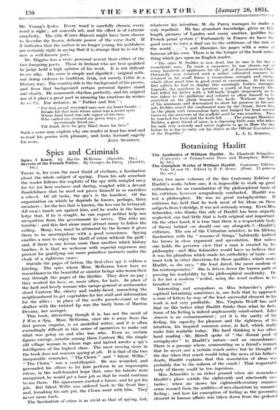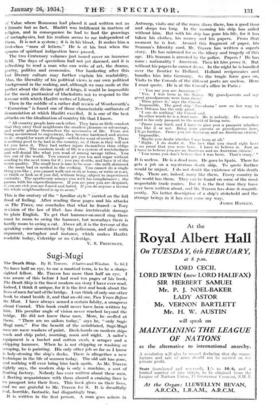Botanizing Hazlitt
The Aesthetics of William Hazlitt. By Elizabeth Schneider. .(University of Pennsylvania Press and Humphrey Milford. 8.4. 6d.) WITH two more volumes of the fine Centenary Edition of Hazlitt's works before one, it is impossible to work up great enthusiasm for an 'examination of the philosophical basis of his -criticism, however scrupulously conducted. Hazlitt was not a philosopher. He was no great metaphysician. If criticism has held that he took most of his ideas on these subject's from Coleridge, it was not seriously wrong. Even Miss Schneider, who thinks this side of Hazlitt has been unjustly neglected, can find little that is both original and important. On the other hand, it is true that there is a respectable body of theory behind—or should one say alongside ?—Hazlitt's criticism. The son of the Unitarian minister, in his lifelong fascination with the " reasons of things," habitually knitted. his brows in close argument and speculation. But unless one holds the perverse view that a man is created by his philosophy—and Miss Schneider would have us believe that it was his pluralism which made his catholicity of taste—one must look in other directions for those qualities which make Hazlitt, as she says, "-the least dated, the most modern of his contemporaries." She is driven down the barren path of provihg his readability by his philosophical modernity. Ile is for her a modern " realist, using the word realism in its
broadest sense."
Interesting and scrupulous as Miss Schneider's philo- sophical lootanizing sometimes is, one feels that 'to approach a man of letters by way of the least successful clement in his work- is not very profitable. Mrs. Virginia Woolf has said that We like better what Hazlitt thinks than what he feels. Some of his feeling is indeed unpleasantly mind-mixed. Liber Amaris is an embarrassinent ; yet it is . the sanity of his feeling, his capacity for pleaSure and the rightness of his intuition, his inspired common sense, in fact, which really make him readable today. His hard thinking is too 'often hard reading—Mr. flinch spoke of " they disnial Pool- of metaphysics " in Hazlitt's nature—and ' an - eheitintorance. There is a passage where, commenting on a' friend's-remark that he never saw a certain coach arrive but he thought of the day when that coach would bring the news of his father's death, Hazlitt explains that this association of ideas was probably due to the redness of the coach ! That respectable body of theory could be too ingenious.
Miss Schneider is on richer ground when she remember,: Hazlitt's place astride the eighteenth and nineteenth -cen- turies ; when she shows Ina eighteenth:century common sense reamed from the nridities of neo-classicism by romantic feeling ; and hoir his conception of feeling as the -governing' elment, in human affairs was taken 'down from the pedestal
of Value. .where Rousseau had placed it and written not as Ultimate but as fact. Hazlitt was indifferent in matters of religion, and in consequence he had to feed the gnawings at metaphysics, but his realism seems to me independent of t hem. It is not a system ; it is in his blood.. It makes him a first-class "man of letters." lie is at his best when the spasms of spiritual indigestion have passed.
The two Centenary volumes just issued cover an immense field. The days of specialism had not yet dawned, and it is refreshing to read a man who can write of art, the drama,
poetry, politics and economics. Our hankering after this lost literary culture may further explain his, readability.
Also, the liberality of his political views is our own political background in the making, and, although we may smile at the
pother about the-divine right of kings, it would be impossible for the most puritanical of blaekshirts not to respond to the
fervour with which Hazlitt writes of Liberty.
Then in the middle of a rather dull review of Wordsworth's
"Excursion'; is found one of those characteristic outbursts of denunciation at which Hazlitt excelled. It is one of the best
attacks on the idealization of country life that I know.
" All country people hate each other. They have's° little comfort that they envy their neighbours the smallest pleasure or advantage, and nearly grudge themselves the necessaries of life. From not being accustomed to enjoyment, they become hardened and averse to it—stupid for want of thought—selfish for want of society. Them is nothing good to be had in the country, or, if there is they will not let you have it. They had rather injure themselves than oblige anyone else. The common mode of life is a system of wretchedness and self-denial like what you read of among savage tribes. You live out of the world. You cannot get you tea and sugar without wilding to the next town for it ; you pay double, and have it of the worst quality. The small-beer is sure to be sour—the milk skimmed - the meat bad or spoiled in the.cooking. You cannot do a single thing you like ; you cannot walk out or sit at home, or write or read, or think or look as if you did, without being subject to impertinent cariosity. The apothecary annoys you with his complaisance ; the parson with his superciliousness. If you are poor you are despised, it you are rich you are feared and hated. If you do anyone a favour t he whole neighbourhood is up in arms."
This is the oratory of the " familiar style " carried on the full flood of feeling. After reading these pages and his attacks 3n The Times, one concludes that what he feared-7a Tory revision of the law of libel—has done irretrievable damage to plain English. To get that hammer-on-anvil ring there must be room to swing the hammer, but nowadays there is hardly, room to swing a cat. Above all, it is the fervour of the
speaking voice unrestricted by the policeman, and alive with argument, Metaphor and instance, which makes Hazlitt readable today, Coleridge or no Coleridge.
V. S. PRITCHETT.











































 Previous page
Previous page